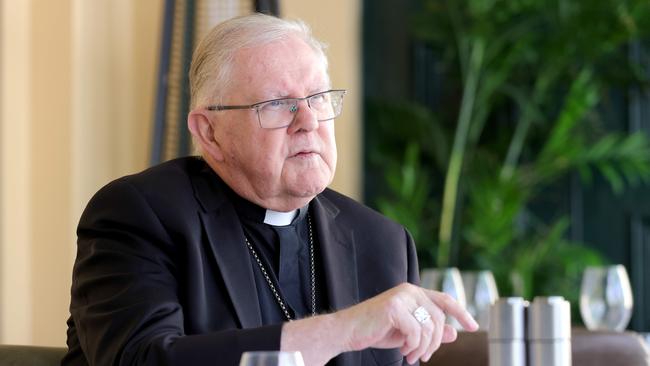
Archbishop Mark Coleridge, effectively the boss of 146 schools, has slammed Qld’s Catholic Education sector saying students are underperforming in key areas. WELCOME TO HIGH STEAKS
What does an ageing Catholic priest make of his church, battered and bruised as it is after 40 years of sexual abuse scandals?
What kind of spiritual offerings can this ancient institution bring to the table when science elbows out religion as the path to enlightenment, and Catholicism is viewed by so many as a relic of the Middle Ages?
In short, what sort of Christian future is there for an increasingly atheist world?
Well, a rather bright one, according to the Most Reverend Archbishop Mark Coleridge, Brisbane’s Catholic Archbishop who is as enthusiastic about the future of Catholicism as he is about the risotto he’s devouring at ‘’Moo Moo the wine Bar and Grill’’ - a restaurant in Edward Street with a history not quite matching that of the One, Holy, Catholic and Apostolic Church, but a fascinating one none-the-less.
His Grace sees Catholicism thriving in the 21st Century.
An end to celibacy for priests is likely while the role of women will expand rapidly even if the Church will be more cautious about the ordination of female priests which Archbishop Coleridge still concedes as a far-off possibility.
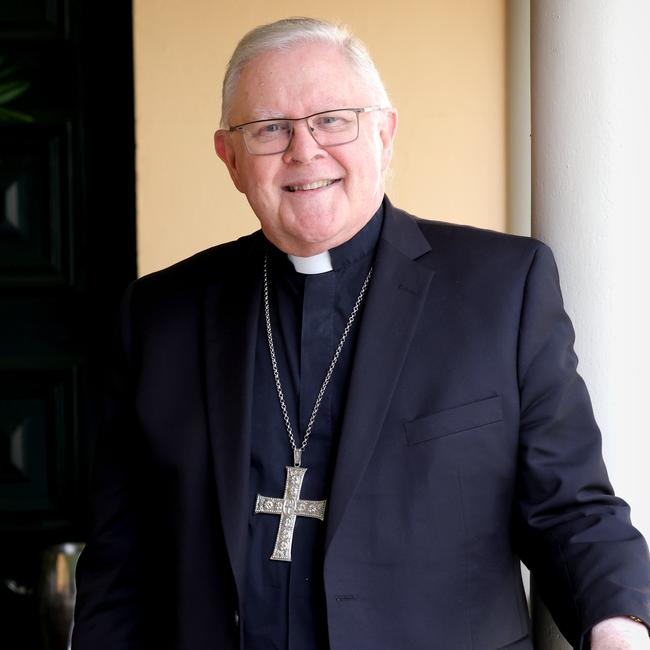
The one certainty is this:
“The days of tribal Catholicism are finished.’’
The archbishop says the Church until recently operated as though it was the sole custodian of eternal truth, “and the rest can go to hell.’’
”We have been a proud Church, and there’s no future in that.’’
The spiritual essence of Catholicism, encapsulated in the life of Jesus Christ, will be at the forefront of the Church’s 21st Century identity, and the archbishop believes the young are already embracing that identity.
“The one thing about the young is that they don’t necessarily want words about God, they want the experience of God,’’ he says.
“A church that can offer an experience of the divine has a chance.’’
The mystical will become more important than the doctrinal and dialogue will open with other faiths, be they other strains of Christianity or the Muslim religion, Hinduism or Buddhism
The Bishop of Rome is already leading the charge to this bright new dawn.
“Pope Francis, I think, is pointing the way to the future, incredibly at the age of 87, when he says that, far from being tribal, the church of the future will have to specialise in communion by which I mean, reaching out to other religions and to all human beings.’’
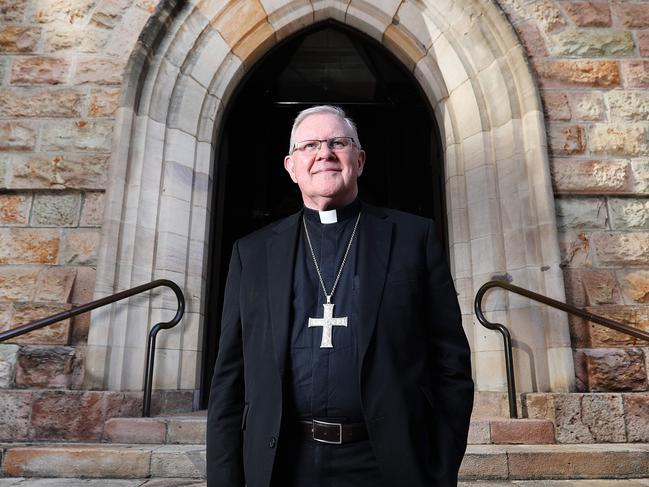
So why the change?
It’s been largely prompted by the hideous sexual abuse scandal which derailed and sometimes utterly destroyed thousands of lives.
Archbishop Coleridge never saw it coming.
He took his vows as a priest at age 25 after years at the seminary and, before that, attended Catholic schools.
“Never once did I see anything or hear anything,’’ he says of the abuse.
”That was one of the reasons why, when this all blew up, I thought it could not possibly be right, but it was right.’’
He sees his own personal reaction to the unfolding horror reflected in the response of the broader church.
“At first there was disbelief and then when it turned out to be true there was kind of a denial which went on for a very long time, and part of that was blaming the victim.
“And then, eventually, denial gave way to a kind of grudging acceptance which in turn gave way to a realistic assessment of the crisis and making the victims the central focus.’’
For a man dedicated to the core principles of the Church, particularly the notion of serving “the poorest of the poor,’’ the betrayal of trust by his colleagues hit him hard, to the point he ponders whether he suffered some psychological damage himself.
“But you can’t spend too much time worrying about that because, whatever it has done to me, it has done far worse to the victims.’’
It’s a grim topic which deserves a sober analysis, but the archbishop is not a pessimistic soul.
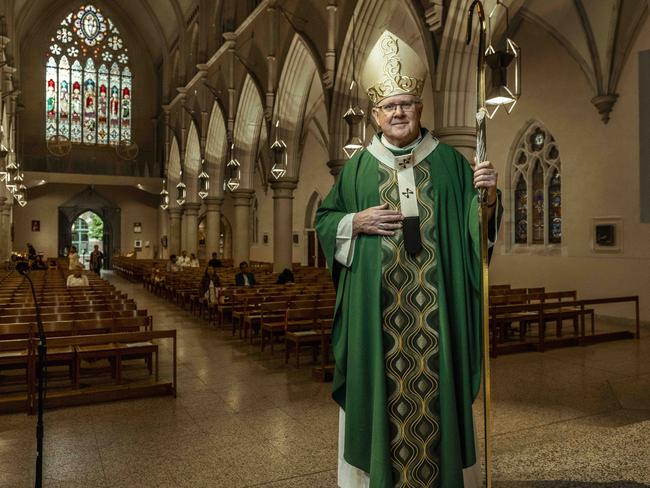
Half a century of teaching theology and playing shepherd to various congregations only seems to have enlivened his generous spirited and good-humoured approach to life.
We’re dining in a majestic building completed in November 1880 to house not merely the Harbormaster but all his attendant minions including the staff of the Marine Board and Shipping Office.
It was the Brisbane Airport of its time, and still retains the grandeur commensurate with its high station in Queensland’s economic pecking order.
His Grace, who has sampled risotto from Melbourne to Jerusalem in a long and storied life spanning 76 years, seriously contemplates this might be “the best one yet’’ - a description dovetailing my own opinion of the simple 200 grams of Fillet Steak served on a largely unadorned plate which is, in my view, the best High Steaks lunch to date.
Throw in the attentive service and we’re looking at a 10 out of 10 rating with a gold star attached for a lunch made all the more enjoyable by the archbishop who has a trove of anecdotes which could only have come from a man once speech writer to a pope.
Born in Melbourne, the third of five siblings, his gift for languages had him contemplating a career in diplomacy after graduating from the University of Melbourne in 1968 with a Bachelor of Arts.
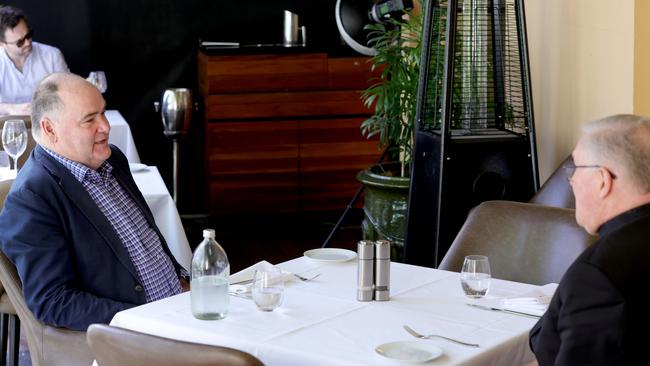
But God gave him a call and he ended up a seminarian at Corpus Christie College, ordained as a priest on May 18 1974.
That gift for languages propelled him towards Rome and the heady atmosphere of international diplomacy as he processed papal correspondence, translating major documents, usually from Italian into English, and even drafting speeches for Pope John Paul 11.
When you know what’s being said between the Pope and heads of state, life can get interesting.
As for his speeches, he occasionally hit a “hole-in-one,’’ meaning his speech survived numerous inspections and revisions leaving the Pope to tell the world exactly what the then more youthful Father Coleridge had authored.
“Other time the speech was barely recognisable as the one I wrote.’’
He loved life in Rome, recalling spirited nights at restaurants and perilous rides home on the back of a vespa scooter piloted by a youthful John Bathersby who was to become Brisbane’s Catholic Bishop in 1991.
The life of a priest suited him and the celibacy rule, even as he concedes it will probably be eventually abandoned, presented no great challenges even when he made the vow at the age of 25.
“At that stage it did not look too challenging but I think it was sometimes in my 40s I felt the pinch a bit more, a bit of a sense of ‘life passing me by’’ you know, without a life partner and without children.
“But you move beyond that.
“Looking back now at the age of 76 I have no regrets. I don’t think it has diminished me or sort of destroyed me.
“I have a sense, perhaps a sense of gratitude but certainly a sense that - “this is where I was met to be.’’
Brisbane’s Catholic community won’t have him for much longer.
He’s hanging up the Pectoral Cross for retirement in a suburban Brisbane cottage, but before he goes, he’s got some work to do, and it’s on this issue he delivers a comment of the “front page’’ variety.
He wants Catholic Education to lift its game.
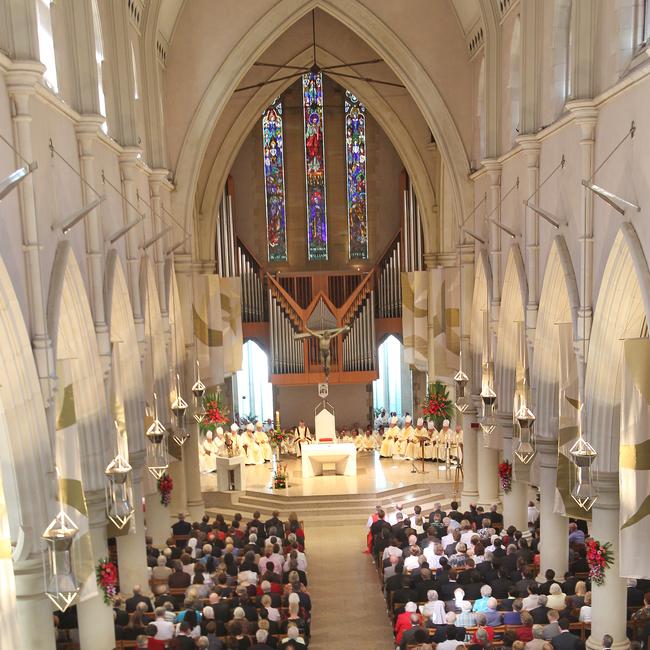
The archbishop, effectively the boss of 146 schools, says students are underperforming in key areas in Catholic education in Queensland.
“I have seen all the data,’’ he says ominously.
“Our schools in Queensland are under performing in literacy and numeracy particularly.’’
Education in Australia has been something of a jewel in the Catholic crown. The Church has been delivering quality education to millions of students since the mid 19th Century, often wavering school fees for parents struggling financially.
Today Catholic schools are more popular than ever, a fact the archbishop readily acknowledges.
“They’re going gangbusters’’ he enthuses.
“But, in a sense, they are more fragile than meets the eye.
”Because if schools are nor performing academically these days, parents will take their kids out and put them where they will get better academic results.’’
Given he’s the ultimate boss, I suggest he may have to give himself a stern talking to.
“Don’t worry, I have been taking a bit of responsibility,’’ he laughs.
But he’s also issuing directives to Catholic Education that everyone has to lift their game.
“This is no secret, I mean I love our schools, I am a teacher at heart.
“Anytime I go to the schools, and I go a lot, 146 schools takes a bit of getting through, I get a great lift.
“Across the board they are doing a great job.
“But I, and others, have been concerned about the academic element because it is not what it should be.’’
He’s clearly concerned about this problem, possibly because teaching, along with the Church, is his great love.
“Teaching is probably one of the best things I do in life, and it is one of the things I intend to continue doing when I retire.’’

Rebel rocker to working for the man: Is J.C. superstar a sellout?
What would John “J.C.” Collins’ younger self think of his modern role commissioned by the state government? The local legend hazards a guess. WELCOME TO HIGH STEAKS
Secrets to eternal youth revealed … but it costs you $6000
Want to know the secrets to unlocking a longer and healthier life? This new clinic uses science to boost our longevity.